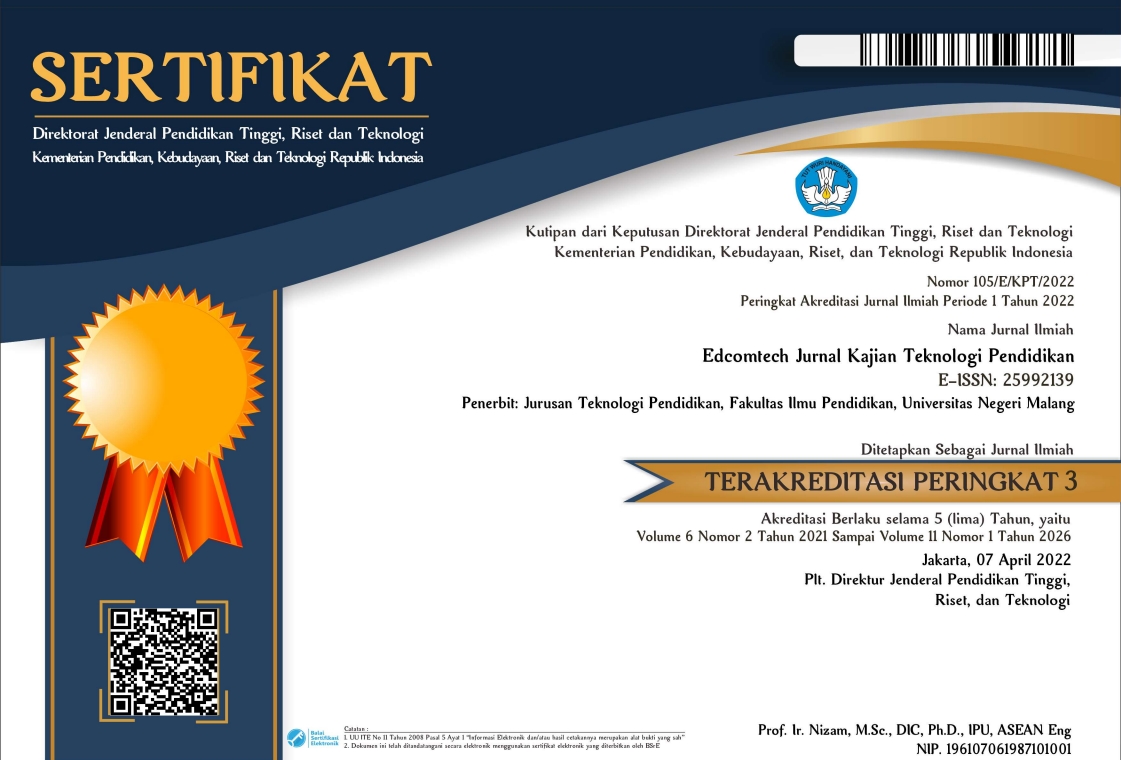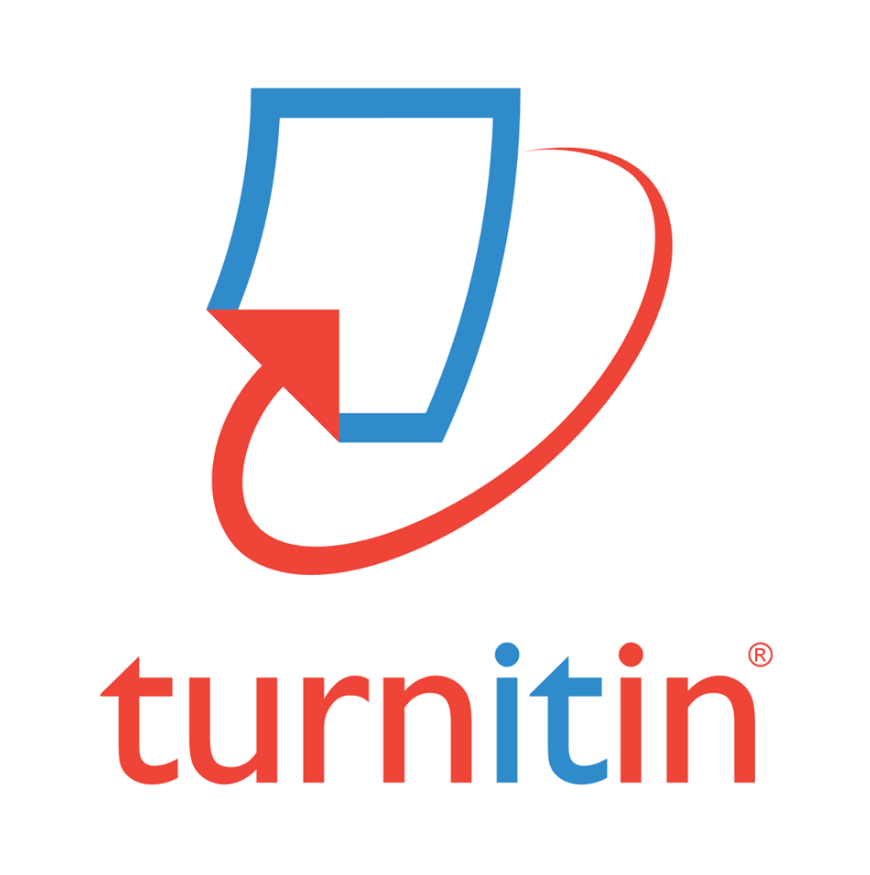How Self Efficacy in Mathematic Based on Gender Perspective?
Abstract
This study aims to determine whether there are differences in self efficacy between middle school male and female students in Mathematics. This research is a quantitative study to find out the level of self efficacy in 108 male students and 118 female students of class VIII middle school, using a self efficacy questionnaire consisting of reasoned statement items with a reliability value of 0.844. The analysis showed that the average self efficacy in mathematics learning for male students was 92.77 and for women 90.27 of the maximum value of 120, was in the high category. This shows that most male and female students have great confidence in solving mathematical problems. Therefore, it can be said that there is no significant difference in mathematical self efficacy between male and female students
Keywords
Full Text:
PDFReferences
Agustina, M. (2019). Analisis Keyakinan Diri (Self-efficacy) Siswa SMA dalam Memecahkan Masalah Matematika Ditinjau dari Perbedaan Gender. Fakultas Keguruan dan Ilmu Pendidikan Universitas Lampung Bandar Lampung 2019. 55.
Bandura, A. (1977). Social learning theory. Prentice-Hall.
Bandura, A. (Ed.). (1995). Self-efficacy in changing societies. Cambridge University Press.
Banes, R. A., Pease, J. H., & Pease, W. H. (1992). Ladies, Women, and Wenches: Choice and Constraint in Antebellum Charleston and Boston. Gender and American Culture. The Journal of Southern History, 58(2), 342. https://doi.org/10.2307/2210878
Bench, S. W., Lench, H. C., Liew, J., Miner, K., & Flores, S. A. (2015). Gender Gaps in Overestimation of Math Performance. Sex Roles, 72(11–12), 536–546. https://doi.org/10.1007/s11199-015-0486-9
Britner, S. L., & Pajares, F. (2006). Sources of science self-efficacy beliefs of middle school students. Journal of Research in Science Teaching, 43(5), 485–499. https://doi.org/10.1002/tea.20131
Bui, H. T., So, K. K. F., Kwek, A., & Rynne, J. (2017). The impacts of self-efficacy on academic performance: An investigation of domestic and international undergraduate students in hospitality and tourism. Journal of Hospitality, Leisure, Sport & Tourism Education, 20, 47–54. https://doi.org/10.1016/j.jhlste.2017.02.002
Concannon, J. P., & Barrow, L. H. (2009). A Cross-Sectional Study of Engineering Students’ Self-Efficacy by Gender, Ethnicity, Year, and Transfer Status. Journal of Science Education and Technology, 18(2), 163–172. https://doi.org/10.1007/s10956-008-9141-3
Davis, J. C., Marra, C. A., & Liu-Ambrose, T. Y. (2011). Falls-related self-efficacy is independently associated with quality-adjusted life years in older women. Age and Ageing, 40(3), 340–346. https://doi.org/10.1093/ageing/afr019
Denissen, J. J. A., Zarrett, N. R., & Eccles, J. S. (2007). I Like to Do It, I’m Able, and I Know I Am: Longitudinal Couplings Between Domain-Specific Achievement, Self-Concept, and Interest. Child Development, 78(2), 430–447. https://doi.org/10.1111/j.1467-8624.2007.01007.x
Durndell, A., Haag, Z., & Laithwaite, H. (2000). Computer self ecacy and gender: A cross cultural study of Scotland and Romania. 8.
Etikan, I. (2016). Comparison of Convenience Sampling and Purposive Sampling. American Journal of Theoretical and Applied Statistics, 5(1), 1. https://doi.org/10.11648/j.ajtas.20160501.11
Friedel, J. M., Cortina, K. S., Turner, J. C., & Midgley, C. (2007). Achievement goals, efficacy beliefs and coping strategies in mathematics: The roles of perceived parent and teacher goal emphases. Contemporary Educational Psychology, 32(3), 434–458. https://doi.org/10.1016/j.cedpsych.2006.10.009
Fuchs, L. S., Fuchs, D., Malone, A. S., Seethaler, P. M., & Craddock, C. (2019). The Role of Cognitive Processes in Treating Mathematics Learning Difficulties. In Cognitive Foundations for Improving Mathematical Learning (pp. 295–320). Elsevier. https://doi.org/10.1016/B978-0-12-815952-1.00012-8
Huang, C. (2013). Gender differences in academic self-efficacy: A meta-analysis. European Journal of Psychology of Education, 28(1), 1–35. https://doi.org/10.1007/s10212-011-0097-y
Huang, X., Zhang, J., & Hudson, L. (2019). Impact of math self-efficacy, math anxiety, and growth mindset on math and science career interest for middle school students: The gender moderating effect. European Journal of Psychology of Education, 34(3), 621–640. https://doi.org/10.1007/s10212-018-0403-z
Husnul Khatimah, & Fatmah. (2019). Proses Berpikir Kreatif dalam Menyelesaikan Masalah Matematika Ditinjau dari Self-efficacy. JURNAL PENDIDIKAN MIPA, 9(2), 128–132. https://doi.org/10.37630/jpm.v9i2.237
Hyde, J. S. (2014). Gender Similarities and Differences. Annual Review of Psychology, 65(1), 373–398. https://doi.org/10.1146/annurev-psych-010213-115057
Imro’ah, S., Winarso, W., & Baskoro, E. P. (2019). Analisis Gender terhadap Kecemasan Matematika dan Self-efficacy Siswa. Kalamatika Jurnal Pendidikan Matematika, 4(1), 23–36. https://doi.org/10.22236/KALAMATIKA.vol4no1.2019pp23-36
Iskender, M. (2009). The Relationship Between Self-Compassion, Self-Efficacy, and Control Belief about Learning in Turkish University Students. Social Behavior and Personality: An International Journal, 37(5), 711–720. https://doi.org/10.2224/sbp.2009.37.5.711
Joo, Y. J., Lim, K. Y., & Kim, J. (2013). Locus of control, self-efficacy, and task value as predictors of learning outcome in an online university context. Computers & Education, 62, 149–158. https://doi.org/10.1016/j.compedu.2012.10.027
Kenney-Benson, G. A., Pomerantz, E. M., Ryan, A. M., & Patrick, H. (2006). Sex differences in math performance: The role of children’s approach to schoolwork. Developmental Psychology, 42(1), 11–26. https://doi.org/10.1037/0012-1649.42.1.11
King-Sears, M. E., & Strogilos, V. (2020). An exploratory study of self-efficacy, school belongingness, and co-teaching perspectives from middle school students and teachers in a mathematics co-taught classroom. International Journal of Inclusive Education, 24(2), 162–180. https://doi.org/10.1080/13603116.2018.1453553
Kurniawati, A. D. (2014). Pengaruh Kecemasan dan Self-efficacy Siswa terhadap Kemampuan Pemecahan Masalah Materi Segiempat Siswa Kelas VII MTs Negeri Ponorogo. 3(2), 6.
Laviolette, E. M., Radu Lefebvre, M., & Brunel, O. (2012). The impact of story bound entrepreneurial role models on self‐efficacy and entrepreneurial intention. International Journal of Entrepreneurial Behavior & Research, 18(6), 720–742. https://doi.org/10.1108/13552551211268148
Lestari, D. T., Senjayawati, E., & Rohaeti, E. E. (2019). Analisis Kesulitan Belajar Siswa SMP Kelas VIII dalam Menyelesaikan Soal Aritmatika di Tinjau dari Kemampuan Komunikasi Matematis. Journal on Education, 1(2), 440–444.
Lishinski, A., Yadav, A., Good, J., & Enbody, R. (2016). Learning to Program: Gender Differences and Interactive Effects of Students’ Motivation, Goals, and Self-Efficacy on Performance. Proceedings of the 2016 ACM Conference on International Computing Education Research - ICER ’16, 211–220. https://doi.org/10.1145/2960310.2960329
Liu, J., Cho, S., & Putra, E. D. (2017). The moderating effect of self-efficacy and gender on work engagement for restaurant employees in the United States. International Journal of Contemporary Hospitality Management, 29(1), 624–642. https://doi.org/10.1108/IJCHM-10-2015-0539
Lloyd, J. E. V., Walsh, J., & Yailagh, M. S. (2005). Sex Differences in Performance Attributions, Self-Efficacy, and Achievement in Mathematics: If I’m so Smart, Why Don’t I Know It? 26.
Mashudi, M. (2016). Penerapan Pendekatan Realistik Untuk Meningkatkan Hasil Belajar Siswa Kelas V Pada Mata Pelajaran Matematika Pokok Bahasan Sifat-sifat Bangun Ruang. JPsd (Jurnal Pendidikan Sekolah Dasar), 2(1), 50–63. https://doi.org/10.30870/jpsd.v2i1.667
O’brien, V., Martinez-pons, M., & Kopala, M. (1999). Mathematics Self-Efficacy, Ethnic Identity, Gender, and Career Interests Related to Mathematics and Science. The Journal of Educational Research, 92(4), 231–235. https://doi.org/10.1080/00220679909597600
Pajares, F. (2002). Gender and Perceived Self-Efficacy in Self-Regulated Learning. Theory Into Practice, 41(2), 116–125. https://doi.org/10.1207/s15430421tip4102_8
Pajares, F., & Kranzler, J. (1995). Self-Efficacy Beliefs and General Mental Ability in Mathematical Problem-Solving. Contemporary Educational Psychology, 20(4), 426–443. https://doi.org/10.1006/ceps.1995.1029
Peng, P., Namkung, J., Barnes, M., & Sun, C. (2016). A meta-analysis of mathematics and working memory: Moderating effects of working memory domain, type of mathematics skill, and sample characteristics. Journal of Educational Psychology, 108(4), 455–473. https://doi.org/10.1037/edu0000079
Qolbi, M. S. U., Thaariq, Z. Z. A., Az-Zahroh, S. F., Anwar, M. M., & Faiza, N. (2019). Design and Development of Game Based Learning Applications for Mathematics Learning Based on Multiple Language to Develop Verbal Capabilities. JPP (Jurnal Pendidikan dan Pembelajaran), 26(2), 51-56.
Rahayu, S., & Hidayati, W. N. (2018). Meningkatkan Hasil Belajar Matematika melalui Penggunaan Media Bangun Ruang dan Bangun Datar pada Siswa Kelas V SDN Jomin Barat I Kecamatan Kotabaru Kabupaten Karawang. Jurnal Pendidikan Sekolah Dasar, 4(2), 204. https://doi.org/10.30870/jpsd.v4i2.3854
Regier, P., & Savic, M. (2020). How teaching to foster mathematical creativity may impact student self-efficacy for proving. The Journal of Mathematical Behavior, 57,100720.https://doi.org/10.1016/j.jmathb.2019.100720
Resmiati, T., & Hamdan, H. (2019). Analisis Kemampuan Pemecahan Masalah Matematis dan Self-Efficacy Siswa Sekolah Menengah Pertama. JPMI (Jurnal Pembelajaran Matematika Inovatif), 2(4), 177. https://doi.org/10.22460/jpmi.v2i4.p177-186
Riani, W. S., & Rozali, Y. A. (2014). Hubungan antara Self-efficacy dan Kecemasan saat Presentasi pada Mahasiswa Univeristas Esa Unggul. 12, 9.
Salavera, C., Usán, P., & Jarie, L. (2017). Emotional intelligence and social skills on self-efficacy in Secondary Education students. Are there gender differences? Journal of Adolescence, 60, 39–46. https://doi.org/10.1016/j.adolescence.2017.07.009
Sandilos, L. E., Baroody, A. E., Rimm-Kaufman, S. E., & Merritt, E. G. (2020). English learners’ achievement in mathematics and science: Examining the role of self-efficacy. Journal of School Psychology, 79,1–15. https://doi.org/10.1016/j.jsp.2020.02.002
Santrock, J. W. (2018). Educational psychology (Sixth Edition). McGraw-Hill Education.
Sasmita, I., & Rustika, I. M. (2015). Peran efikasi diri dan dukungan sosial teman sebaya terhadap penyesuaian diri mahasiswa tahun pertama Program Studi Pendidikan Dokter Fakultas Kedokteran Universitas Udayana. Jurnal Psikologi Udayana, 2(2), 280–289.
Schöber, C., Schütte, K., Köller, O., McElvany, N., & Gebauer, M. M. (2018). Reciprocal effects between self-efficacy and achievement in mathematics and reading. Learning and Individual Differences, 63, 1–11. https://doi.org/10.1016/j.lindif.2018.01.008
Schyns, B., & Sanders, K. (2005). Exploring gender differences in leaders’ occupational self‐efficacy. Women in Management Review, 20(7), 513–523. https://doi.org/10.1108/09649420510624747
Sezgintürk, M., & Sungur, S. (2020). A Multidimensional Investigation of Students’ Science Self-Efficacy: The Role of Gender. İlköğretim Online, 208–218. https://doi.org/10.17051/ilkonline.2020.653660
Sheu, H.-B., Lent, R. W., Miller, M. J., Penn, L. T., Cusick, M. E., & Truong, N. N. (2018). Sources of self-efficacy and outcome expectations in science, technology, engineering, and mathematics domains: A meta-analysis. Journal of Vocational Behavior, 109, 118–136. https://doi.org/10.1016/j.jvb.2018.10.003
Sunaryo, Y. (2017). Pengukuran Self-Efficacy Siswa dalam Pembelajaran Matematika Di MTs N 2 CIAMIS. Teorema: Teori dan Riset Matematika, 1(2), 39–44. https://doi.org/10.25157/teorema.v1i2.548
Thaariq, Z. Z. A., Surahman, E., Murti, S. A., Faqiroh, B. Z., & Kusworo, N. R. (2020, December). Analysis of Learners Characteristics and Learning Process Preferences during Online Learning. In 1st International Conference on Information Technology and Education (ICITE 2020) (pp. 49-54). Atlantis Press.
Universitas Lampung, Anah, I., Yolida, B., & Jalmo, T. (2019). Hubungan Self-Efficacy Berdasarkan Gender dengan Hasil Belajar IPA. Jurnal Bioterdidik: Wahana Ekspresi Ilmiah, 7(4), 1–9. https://doi.org/10.23960/jbt.v7.i4.201901
Yuliani, A., Kusumah, Y. S., & Sumarmo, U. (2018). Mathematical creative problem solving ability and self- efficacy: (A survey with eight grade students). Journal of Physics, 6.
Zeldin, A. L., Britner, S. L., & Pajares, F. (2008). A comparative study of the self-efficacy beliefs of successful men and women in mathematics, science, and technology careers. Journal of Research in Science Teaching, 45(9), 1036–1058. https://doi.org/10.1002/tea.20195
Zientek, L., Dorsey, J., Stano, N., & Lane, F. C. (2019). An investigation of self-efficacy of students enrolled in a mathematics pathway course. Journal of Applied Research in Higher Education, 11(3), 636–652. https://doi.org/10.1108/JARHE-10-2018-0207
DOI: http://dx.doi.org/10.17977/um039v6i12021p036
Refbacks
- There are currently no refbacks.
Copyright (c) 2021 Kasturi, Sulton, Agus Wedi

This work is licensed under a Creative Commons Attribution-ShareAlike 4.0 International License.
Edcomtech: Jurnal Kajian Teknologi Pendidikan published by Department of Educational Technology, Faculty of Education, State University of Malang in Collaboration with Asosiasi Program Studi Teknologi Pendidikan Indonesia (APS TPI) and Ikatan Profesi Teknologi Pendidikan Indonesia (IPTPI) with MoU.
Publisher Address:
Lab. Teknologi Pendidikan, Gd.E2, Lt.1
Fakultas Ilmu Pendidikan Universitas Negeri Malang
Jalan Semarang No 5, Kota Malang Kode Pos 65145
Email: edcomtech.fip@um.ac.id
========================================================================================================
| INDEXED BY | TOOLS | PLAGIARISM CHECK | ARTICLE TEMPLATE |
|

Edcomtech is licensed under a Creative Commons Attribution-ShareAlike 4.0 International License.
Edcomtech Statistics (Since July 13th, 2020)












1.png)








